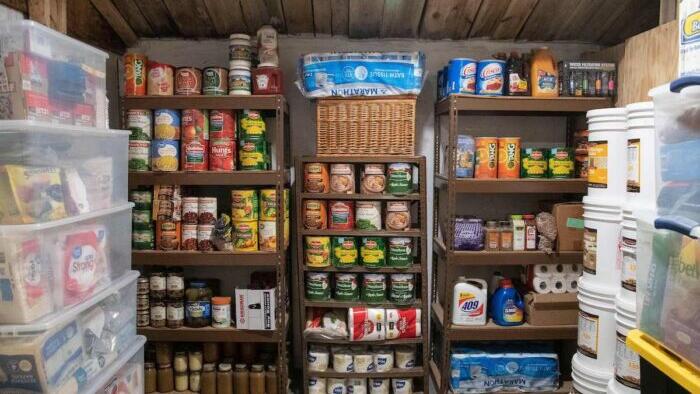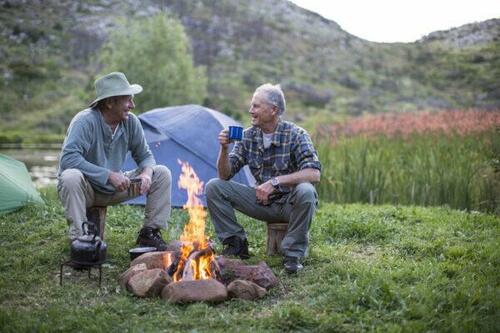
Posted on 05/12/2022 10:41:48 PM PDT by blam

A storage room stacked with food is seen at a preppers ranch in Mathias, West Virginia, on March 13, 2020.
Most people don’t bother to prepare for uncertain times until it’s too late. It’s the “ant and the grasshopper” parable written on a human scale.
“The problem is that while fear is a great motivator, it isn’t conducive to smart decisions,” said Diane Vukovic at Primalsurvivor.com, an online personal preparedness website.
“No matter how terrified you are about a certain event happening, you still need to go about prepping in a calm, logical way,” Vukovic told The Epoch Times.
Once considered a fringe “conspiracy theory,” the idea of preparedness has gone mainstream as global events unfold. Many online “preppers” have said that only a small percentage of Americans prepare for potential food shortages and civil unrest. However, the concern among would-be preppers on a limited income is the cost of preparing in an inflationary environment.
The good news is that prepping is still relatively inexpensive to do, Vukovic said.
“Chances are you don’t need an expensive gas mask, bulletproof vest, or other hyped-up survival gear. You’ll see that most preparedness supplies are very cheap,” Vukovic said.
Rule number one is don’t buy out of fear or panic.
“I suggest writing a list of the most likely disasters for your area. For most people in the United States these will be earthquakes, floods, hurricanes, wildfires, and power outages. Then, make a list of what items you would need to be prepared for these disasters,” she said.
What’s On The Menu?
Prepperwebsite.com host Todd Sepulveda recommends budget-minded preppers start with a menu of necessary items such as dry food and canned goods, which are still plentiful at the grocery store.
“People trying to prep their food storage sometimes go to the grocery store and start buying random items. Later, they have to try and figure out how it will all work together and put dinner together,” Sepulveda told The Epoch Times.
“Starting from a menu takes out all the guesswork and ensures that you won’t buy unnecessary items at the grocery store.”
Sepulveda advises making a one-week menu of breakfast, lunch, and dinner of what your family usually eats, making a grocery list, and keeping a clean copy for the following week.

Empty shelves for pasta are seen at a supermarket on Jan. 13, 2022, in Monterey Park, California.
“If you want to stock up a month’s worth of food at one time, just quadruple your list,” Sepulveda said. “You can bring more variety to your family food storage if you make a two-week menu and double that. That way, you are not eating the same foods every week.”
Food storage isn’t hard and doesn’t have to be expensive—”you just need to plan it out,” Sepulveda said.
Other websites that cater to preppers of all experience levels include Graywolf Survival, Apartment Prepper, Bioprepper, Mom With A Prepper, The Prepared, and many others.
These sites cover a full range of topics on disaster preparedness—from creating emergency kits and bug-out bags, medical and first-aid supplies, water filtration, cooking without electricity, solar power, and living off-grid.
“Even if you have zero money to spend, you still have a budget—it’s just zero. And, yes, it is possible to prepare with absolutely no money,” Vukovic said.
She said once you have a list of everything you need, prioritize the items—trash bags and buckets, for example, are inexpensive or even free.
“To make sure you don’t forget anything important, divide your list into categories. As you buy supplies, make sure you get items from each category.
The critical supplies categories include food and water, water purification, health and hygiene, heating, lighting, electricity, disaster cleanup, personal safety, and emergency radio communications.
Live Within Your Means
Even if you have no money for prepping, you’ll need to know about wilderness survival and how to make supplies even on a shoestring budget.
“For example, you can get free buckets from local stores. In an emergency, these buckets could then be used for things like collecting rainwater or making an emergency toiler, which is incredibly important but something a lot of people forget about,” Vukovic said.
If you have a small budget, divide your list into expensive items: propane camp stove, propane heater, personal safety, and inexpensive items such as canned food, tarps, tape, and bleach.
“Buy a few inexpensive items every week and set aside a certain amount of money each week or month to go towards pricier items,” Vukovic said. “Consider shopping at thrift stores, flea markets, and yard sales for lower prices on gently used items.”
For those fortunate to have a large budget, Vukovic recommends that beginning preppers resist the urge to buy “fancy” or “cool” gear and supplies at the outset.
“Instead, do your research and invest in quality items that have good reviews [or] come highly recommended by those who have used the item. Otherwise, you might find the item you bought is unsuitable for your needs and have to buy another,” Vukovic said.
It’s also important to back up all essential documents in a significant life-altering event, she said.

“Having backups of your important documents might not be a life-or-death issue, but it will make the aftermath of a disaster much less stressful,” Vukovic said.
“For example, if your entire home is destroyed in a fire, knowing your insurance policy number and having a list of valuables in the home will make it easier to get a refund.
“Likewise, if your children had to switch schools after a disaster, you’d be grateful you backed-up copies of their school records.”
Backing up your documents can be done cheaply or at no cost, she added.
“You can put them on an encrypted USB and keep this in a bank safe or other secure location. There are also some secure cloud storage platforms you can use,” Vukovic said.
“While you are at it, back up all of your family photos. If your home is destroyed, at least you won’t lose all of your children’s baby photos and other memories.”
That’s great. I wish more people would similarly prepare.
And, for me at least, preparation has to be holistic. By this I mean that it has to include:
1. Resources: Adequate amounts of food, access to potable water, weapons and ammunition, medical supplies. Sufficient resources, and then sufficient backups because sh!t happens.
2. Knowledge: It can be quite amazing how often people simply stockpile things but lack the knowledge on what to do and how to do it. For me, knowledge means a keen understanding on advanced first aid, care under fire, etc; comprehensive gun training (and I don’t mean shooting at paper targets); how to grow food, how to hunt, how to preserve food assuming electricity and similar modern conveniences are unavailable; etc. Without knowledge a severe toothache can mess most people up, and let’s not even get into things like dysentery. As someone who grew up in Africa I know the many ways nature can muck someone up! Same thing for firearms - having them doesn’t mean knowing how to use them, and in a TEOTWAWKI situation, people will not simply be standing there for you to shoot them. No. They will be making it very hard for you, and for that matter, shooting back. Be better than them!
3. Exercise: Without being rude, I always chuckle when I see the 300 pound prepper with his arsenal of three dozen firearms but he can’t even run 100m without putting himself at risk of death. Sure, I know the old ‘my bullets will do the running for me,’ but what if you meet someone else who’s interested in your stuff, also shoots as well as you do, but unfortunately for you has the physicality of Captain America/Black Panther/Batman? Oh, and any human predators coming your way are likely to be quite fit. If things really do get crazy the world will be divided into predator, prey and protectors - and predators will tend to be physically very capable. So, it is very important to exercise. Have the strength. Get the cardio. Know how to fight with your hands. Understand a gun is not a magic wand but merely a tool, and that you are the weapon. Consequently, sharpen your weapon! Most people don’t, and in my humble opinion I see such people are supply caches/repositories of stuff. Because it will be taken from them. They are simply there to collect it and keep it safe for others to come take it.
4. Geographical locus: If number 3 makes me laugh then number 4 makes me sad. There are many preppers who plan to ride things out in urban and surburban areas. Those are dead men! I even know someone who bought a generator so he can have electricity when his neighborhood goes dark, not knowing that will attract everyone around for miles. Any place within a certain distance from large cities will be overrun. I do not care how many guns you have. The marauding hordes will break down your doors and take your stuff. Many of those will include your neighbors - at first asking nicely for help, but by day 5 demanding that you share. There will be fires. There will be hungry, confused people seeking resources (the marauding horde). There will be specialized predators who have coalesced together to survive by simply taking from the weak. Anyone who doesn’t get out of urban and suburban areas within a certain timeframe is basically finished …unless he (and I mean he, since women will not really enjoy ‘living’ in urban/suburbia ….) turns evil and joins the specialized predators. Having a location away from major cities is going to be important.
5. Friends: You will need people to help defend you. A community is far better able to defend itself, keep its resources (and if evil, even take the resources of others) better than a Lone Ranger. Few preppers unfortunately think about that - it’s all about their secret stash. Even DEVGRU and DELTA operate in teams. James Bond and other lone specialists only really exist in movies.
When it is time to prepare it is too late.
I have been laughed at, lampooned, and ridiculed for my stash of essentials by friends and family. My only prepper regret is I didn’t get more chicks and seeds for this year. But on the lighter side I have convinced once liberal associates to start prepping. We won’t be short of anything.
Make friends with your neighbors, y’all.
FYI. I just noticed your pics... Strange issues going on with my computer.
There is no bleach. You NEED bleach.
Bkmk and bump.
bookmark
Bottle bleach doesn't keep for very long. For water purification stock dry crystal pool shock.
Ping
The Mormon Church states that everyone should have 100 lbs. of Rice and 100 lbs of Beans plus 25 lbs of powdered milk in storage for personal sustenance of a year or more.
we just don’t eat that much rice...still working my rice preps from several yrs ago with bammy....
Good to know, and I’m working on it.
Also, imagine what it would be like to live without electricity. I have two water wells, and I can get water from both of them without using one watt. Also, learn how to use your backyard BBQ pit by burning hardwood instead of propane or charcoal.
Gasoline will go bad fast in small one gallon containers. But, in 5 gallon containers, it will go way over a year. I store gas like this all the time for my gas powered equipment and farm ATVs. Adding a couple of ounces of Marvel Mystery Oil to each 5 gallon can seems to really help keep it fresh, and it won't damage your car or truck. I've been adding that stuff to my car/truck gas tank all the time at fill up to keep my fuel system and injectors clean, and I've never had a problem after hundreds of thousands of miles.
Regarding vehicles, I also keep two or more oil and filter changes for everything I have in reserve.
See my tagline.
For small engines, “high test” lasts longest.
I just added a pitch fork to my TEOTWAWKI supplies.
Store foodstuffs in metal tins...
I am not going to live my life around food. I am a food addict and it’s not good for me to be hoarding the drug.
bfl
Disclaimer: Opinions posted on Free Republic are those of the individual posters and do not necessarily represent the opinion of Free Republic or its management. All materials posted herein are protected by copyright law and the exemption for fair use of copyrighted works.